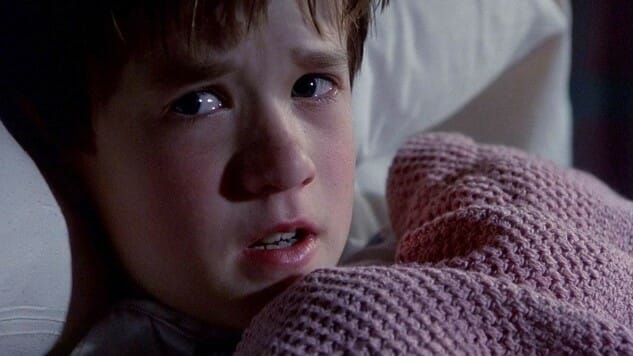The Best Horror Movie of 1999: The Sixth Sense

This post is part of Paste’s Century of Terror project, a countdown of the 100 best horror films of the last 100 years, culminating on Halloween. You can see the full list in the master document, which will collect each year’s individual film entry as it is posted.
The Year
The decade comes to a close in decent enough fashion, featuring several films that made outsized pop cultural impacts, especially in terms of box office figures. In fact, until it was overtaken by 2017’s It, The Sixth Sense had clung doggedly to the title of the highest grossing horror film of all time (not adjusted for inflation), with a muscular $672 million. And considering that The Blair Witch Project took in $248 million earlier the same summer, that made 1999 one of the biggest years ever for the genre at the box office.
Of the other contenders this year, then, you have to give special attention to Blair Witch, a true case of audiences being utterly captivated by a new method of presentation. “Found footage” as a concept had existed for quite a while, at least since 1961’s The Connection and used to an extent in 1980’s infamous Cannibal Holocaust, but for most audiences, The Blair Witch Project was their first exposure to the idea of a feature film being presented as a recovered artifact. Combined with an extremely effective marketing campaign that established precedents for covert online advertising, where rumors were spread of the film’s veracity, otherwise rational human beings went to see Blair Witch genuinely believing that they were watching a snuff film being distributed by a major Hollywood film studio. The film became a sleeper sensation, with enthusiastic word of mouth ultimately making it one of the most profitable independent films of all time, despite a largely plotless runtime that mostly just consists of its characters wandering around in the woods. The brilliance of its closing sequence, however, along with the unresolved nature of the story’s central mystery, would go on to preserve its infamy, while providing obvious inspiration to all the prominent found footage films that would follow, from Paranormal Activity and REC to Cloverfield or Chronicle. The gimmick would gain strength in the late 2000s, peaking in the early 2010s.
Takashi Miike’s Audition likewise caused quite a stir in 1999 for its sadomasochistic-seeming approach toward cinematic violence, with content that had some critics calling for obscenity charges. Ultimately a story of extreme, inhuman romantic obsession, the film has since inspired perspectives that claim it is either a feminist or deeply misogynist work, but no one will argue that its final act torture scenes are anything other than difficult to witness.
The ferocity of Audition is nearly matched by the appetite of Antonia Bird’s Ravenous, which features an unforgettably toothy performance by a cannibalistic Robert Carlyle and a captivating score from Michael Nyman and Damon Albarn. In general, this was a solid year for bigger budget, quasi-horror fare as well, from Kevin Bacon’s Stir of Echoes, to the rollicking (and increasingly championed) action-horror hybrid of The Mummy, to Tim Burton’s particularly Burtonesque reimagining of Sleepy Hollow.
After a decade that was particularly erratic in the quality of its horror offerings, it seems like we’re heading into more reliably strong territory.
-

-

-

-

-

-

-

-

-

-

-

-

-

-

-

-

-

-

-

-

-

-

-

-

-

-

-

-

-

-

-

-

-

-

-

-

-

-

-

-








































